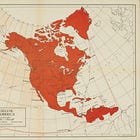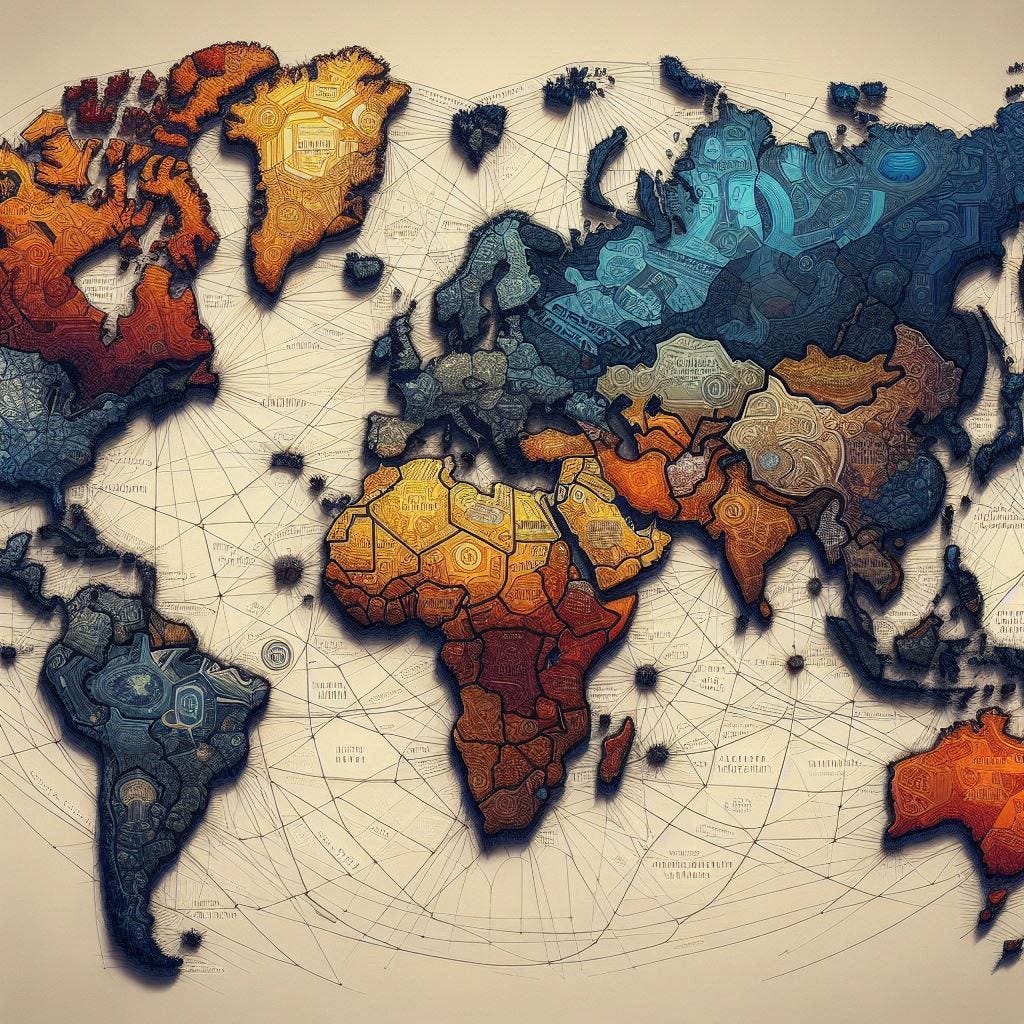Quotes on Regionalism and World Order
From Their Own Words
By Carl Teichrib
My last substack report, part two in a series on regionalism, demonstrated that the idea of North American integration has been circulating for many years. And this month, the Winnipeg-based Frontier Centre for Public Policy released an article supporting continentalism as a means to overcome Canada’s economic stagnation,
Today, the rationale for a Can-Am union is arguably stronger than ever. A truly unified North American market—underpinned by shared rules, a common currency and harmonized supply chains—would reduce transaction costs, attract capital and boost investor confidence.
As a frustrated Canadian, I get it; there is dim hope that our country will seriously right itself under the weight of its own internal contradictions and government overburden. At the same time, amalgamating within a North American union carries its own set of risks. While there’s no doubt that combining the continent’s resources would powerfully position North America, the fact remains that regionalism has consistently been associated with larger aspirations — structures of global order and the “sharing of sovereignty” within the context of internationalism.
For the reader to better grasp this regional-global interlock, consider these fifteen quotes and points of explanation; a small taste of the conversation within the international community, and within the literature of regionalism/world order.
1. “…let us create regional continental units…the European Union, an American Union, which I’ve been pushing too – and this how you got the trade agreement between the US and Canada. And then we’ll take the five continents, and the five continents, if they’re united, will create a World Union.”
– Robert Muller [former UN Under-Secretary-General], speaking to the Global Citizenship 2000 Youth Congress, April 5, 1997, Vancouver BC, Canada.
2. “The EU is the first example of a supranational union that has abolished the borders between its member countries, and can act to abolish national borders beyond Europe.”
– Guido Montani, “The World Federalist Movement Strategy to Bring About a World Constituent Movement,” The Federalist, 2022.
3. “The very fact that the European Union has been so successful at attracting the countries on its borders indicates that other countries might be prepared to enter into a sovereignty-sharing arrangement at [the] global level.”
– Mark Corner, The Binding of Nations: From European Union to World Union (Palgrave, 2010), p.199.
4. “[Regionalism] allows different actors, regions and institutions to play a role in building global order. Regionalism is not by itself an agent of global fragmentation; it can also be a building block or be complimentary to global institutions and processes.”
– Amitav Acharya, UNESCO Chair in Transnational Challenges and Governance, E-International Relations, April 15, 2016.
5. “As we consider ways to make multilateral institutions more effective, and to meet the current and future challenges facing people and planet, we need the perspectives and engagement of local and regional authorities.”
– United Nations Secretary-General, António Guterres, UN Press Release, (SG/SM/21979), 6 October 2023.
6. “The rising role of regionalism in the global economy may alter not only the contours of the global economic architecture, but may also be a source of change with respect to the spirit and the vision of globalization.”
– Yaroslav Lissovolik, Regionalism in Global Governance: Exploring New Pathways (Valdai Discussion Club, 2019), p.10.
7. “Regional integration between sovereign states… is a booming phenomenon, and, not surprisingly, it is nowadays seen as a process that, together with globalization, challenges the existing Westphalian [nation-centered] world order.”
– Luk Van Langenhove and Ana-Cristina Costea, Inter-regionalism and the Future of Multilateralism (United Nations University – CRIS Occasional Paper, 2005), p.10.
8. “…regional governance is not incompatible with and does not negate global governance. On the contrary, it has the potential to strengthen global governance. The regional logic has always been inherent to the global body…”
– Tânia Felício, Managing Security as a Regional Public Good: A Regional-Global Mechanism for Security (United Nations University-CRIS Occasional Paper, 2005).
9. “…the new regionalism includes economic, political, social and cultural aspects, and goes far beyond free trade. Rather, the political ambition of establishing regional coherence and regional identity seems to be of primary importance. The new regionalism is linked to globalization and can therefore not be understood merely from the point of view of the single region. Rather it should be defined as a world order concept… The new global power structure will thus be defined by the world regions, but regions of different types.”
– Björn Hettne, “Globalization, the New Regionalism and East Asia,” Globalism and Regionalism (United Nations University Global Seminar, 2-6 Sept 1996), p.6.
10. “…regionalism need not be opposed to globalism. The world should not have to choose between one or the other. It needs to live with both. The challenge… is how to channel the forces of regionalism in directions compatible with and supportive of globalism.”
– Regionalism in a Converging World (Trilateral Commission/Trilateral Papers #42, 1992).
11. “The world is now witnessing a growing trend where countries are turning to regional partnerships to secure their political, socio-economic, and strategic interests. Various regions from Europe to Asia, Latin America to Africa, and the Middle East are responding by bolstering intra-regional cooperation. These regions are adapting quickly and investing in trade, security, and governance to strengthen their intra-regional collaboration and enhance their influence in the evolving world order. Regionalism has transformed itself from being a rather supplementary feature of global politics to a core aspect of contemporary global dynamics.”
– Fatima Yousofi, “The rise of Regionalism in World Politics: Trends and Implications,” Modern Diplomacy, May 7, 2025.
12. “Regional organisations, insofar as they bring together groups of states, must be understood as building blocks of the world community, an intermediate level between nation-states and global institutions. They do not replace states, nor do they eliminate their autonomy. They constitute the framework within which legislative, executive and judicial bodies can evolve to enable them to address issues with a regional dimension. In accordance with the principle of subsidiarity, nations should ideally be represented at regional level, and the world’s large regions at global level.”
– Lucio Levi, “The Aggression Against Ukraine and the Outlook for Federalism in the World,” The Federalist, 2022.
13. “These two issues, globalization and the North American Community, are inextricably connected. If we fail in our task of creating a North American Community, I submit to you that we will also fail in the broader task of adapting to globalization…”
– Remarks by Bruce Stokes, Toward a North American Community? Conference Report (Woodrow Wilson International Center for Scholars, 2002), p.24.
14. “It is a question of identifying the framework in which it is possible to develop a process of federal unification at world level. And to do this, we first have to consider a series of questions: Can a global unification process be started without the establishment of a number of regional federations? Are the two processes superimposable, and to what extent? Before regional integrations are complete, is it a good thing for their member states to become part of global institutions of a supranational character, or would this instead slow down the development of these integrations? If the conditions for starting a federative process at a regional and/or global level are lacking, what forms of international cooperation or what other objectives or favourable conditions need to be promoted in order to then be able to start such a process? These are connected issues concerning the conditions in which it is possible to start and/or complete federative processes.”
– Roberto Castaldi, “Issues for the Development of a Theory of World Federalism,” The Federalist, 2023.
15. “The formation of regional federations – insofar as they do not become an end in themselves or run the risk of crystallising into blocs – can and should contribute to the effective functioning of [world] federal government.”
– Montreux Declaration, August 23, 1947.




